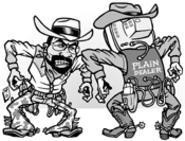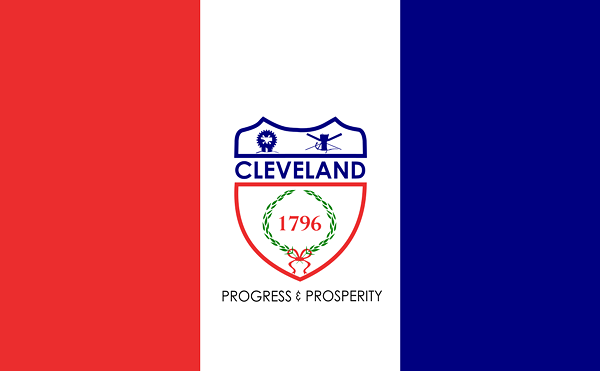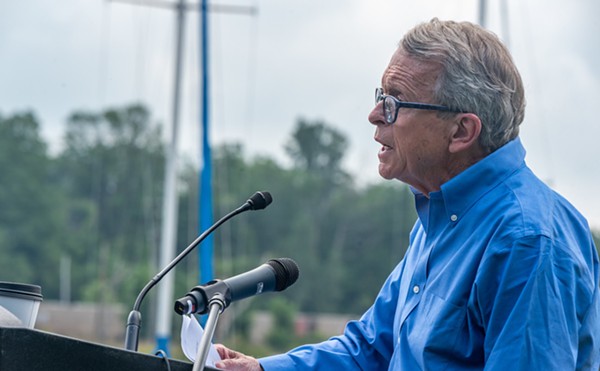But he wouldn't shake The Plain Dealer so easily. On October 3, 1999, the mayor awoke to a metro section with a photo of his new home. Accessible only by a gravel road, the house had been photographed from a rented helicopter.
The accompanying story was strictly lightweight fare: a few facts on the mayor's home purchase, some quotes from residents, a quick synopsis of Newcomerstown's racial history. Yet White saw it as anything but banal. In his eyes, it was proof that The Plain Dealer had singled him out for a most intrusive brand of scrutiny.
More than a year later, White still wonders "why The Plain Dealer is not flying over the houses of other elected officials and why The PD is not dispatching multiple groups of reporters attempting to interview their neighbors on personal matters."
His resentment is indicative of the heated relationship between Cleveland's most powerful politician and the city's largest news organization. Over the past few months, the mayor has repeatedly denounced the paper's bias. He's refused to talk to its reporters, failed to inform them of press conferences. When the paper griped about White's slow release of public records, the mayor's aides responded by sending copies of PD requests to every media outlet in town, thus tipping off competitors to the paper's stories. Even the often snippy correspondence between The PD and City Hall was being faxed to reporters near and far.
It's not unusual for politicians to take aim at newspapers. Press and politician are combative by nature. What is unique is the brazenness with which White has gone about it. While most in his trade prefer to keep their beefs in the shadows, lest they appear petty, the mayor's disdain is unabashed.
"Why would I talk to a media outlet that purposefully distorts the truth?" asked White in a written response to questions submitted by Scene. "The decision to phase out The Plain Dealer was made after years of attempting to obtain fairness and balance in its coverage of my administration. Clearly, we were unsuccessful."
White's first term was pleasant enough. The election's surprise winner over George Forbes in 1989, he had the people's mandate and City Council's rubber stamp.
Former Managing Editor Gary Clark acknowledges the paper sicked a pack of aggressive reporters on White shortly after the election, though paydirt would not be struck till his second term. The paper reported suspicions about a city contract granted to a White pal; then it explored the mayor's role in Art Modell's threat to leave town. Mayors should expect such coverage as an occupational hazard, but Clark says White was different.
"He's had a thin skin from the day he took office," says Clark, now city editor of The Columbus Dispatch. He recalls how former Plain Dealer City Hall reporters Benjamin Marrison and Alison Grant got on White's bad side, suffering through long spells of mayoral boycott. Marrison reported on the building contracts at the airport. Grant's chief offense appeared to be her coverage of cost overruns at Cleveland Browns Stadium.
"He would get very angry with reporters about stories they'd written," says Marrison, now editor of The Columbus Dispatch. "He'd try to ignore you at press conferences or when you tracked him down at public events . . . He knows how to make life difficult for you as a reporter. He tries to shut you down."
Clark says he's proud that reporters went after the mayor, even if it frequently meant losing him as a news source. "If The Plain Dealer doesn't tell those stories, there's no one else who will. Nobody else is in City Hall every day asking those questions."
Others thought they weren't tough enough. White's arch-rival, Council President Mike Polensek, says the mayor got a "free ride" his first nine years in office. Many in the PD newsroom held similar views. In the early '90s, Marrison says, the editorial page was always faithful to White. Another former reporter, who asked not to be named, says that in the mid-1990s, White's complaints to PD executives trickled down to the newsroom, softening coverage. Former Editor David Hall allegedly resigned in part because he grew weary of top-down pressure to lay off City Hall.
(Hall, who lives in Chagrin Falls, handled Scene's interview request with dispatch: "You're not going to talk to me about it. Have a nice day." Click.)
None of this seemed to concern Doug Clifton, a former executive editor of The Miami Herald, who arrived as the new editor in May 1999, toting Pulitzer credentials and a hardball style that seemed impervious to external pressure. He and White seemed a match made for combustibility.
One of Clifton's first orders of business was a conversation with White about speedier, easier access to public records. White says he looked into the matter personally and made the system more "user friendly." But as the mayor tells it, Clifton was still not satisfied and responded by deriding White's record-gathering staff as "stupid and incompetent."
"That is not what I said, not at all," Clifton counters. "How could I make such a sweeping and broad statement as that about people I don't even know?" He concedes that the records system did improve with the mayor's effort, though "the spirit of openness still isn't there."
From White's perspective, the initial encounter was a foreboding one. "I took this as a sign that Doug Clifton was not interested in a fair, objective relationship with my administration."
He says his fears were confirmed a month into the Clifton editorship, when the paper continued to chronicle White's fallout with the police officers' union. Then in August, The PD offered a vivid account of a meeting White had with George Forbes. The confab was designed to produce a cease-fire between the two men over the mayor's permitting of a Ku Klux Klan rally. But during the meeting, the NAACP chief apparently took umbrage to White's parting comment about his eyesight -- "I hope you don't go blind" -- and responded by throwing a chair, a coffee pot, and a sugar tray at Hizzoner.
The PD recounted the incident in blow-by-blow detail. The story about his vacation home ran soon after.
White considers the coverage malicious and invasive. Clifton's response is empathetic but perfunctory. "I understand why the mayor might feel that way, but he is a public person, and there's public curiosity about the way he lives his life. He's the Grand Pooh-bah, the chief executive of the city, and as such he has a much higher profile. One sacrifices a certain degree of privacy."
Councilman Joe Cimperman agrees. "You're a politician, and people want to know about you. They want to know what your favorite dessert is. It all comes with the job."
But White points to articles that celebrate successful government policies, yet ignore his instrumental role. He contends his name surfaces only as a scapegoat, and he accuses the paper of factual mistakes and misquoting cabinet members. Despite Press Secretary Brian Rothenberg's letters to the editor, retractions aren't printed often enough for the mayor's liking.
Reporters also refuse to attend White's public events, says Rothenberg, dismissing them as "ribbon cuttings," though the mayor has traditionally used them to dispense his thoughts on city business. As his quotes dwindled, White's enemies on Council were quoted in droves. And The Plain Dealer began flooding the mayor's office with public-records requests.
White felt targeted, and it showed in print. Articles by Chris Quinn, the paper's City Hall reporter, commonly contained White's terse "No comment." The mayor's press office returned calls at a slowing pace -- if it called back at all, say reporters.
In many cases, that's the only choice White has, concludes Councilman Roosevelt Coats. "There's certain times it's best not to talk to The Plain Dealer, because the media is always looking for sensationalistic stuff."
But the paper needed to inform readers about the mayor, even if he wouldn't talk. This dilemma was at the heart of the most daunting public-records request anyone in the mayor's office had ever seen. The newspaper asked for the e-mails of the mayor and those of his 20 closest directors and assistants over the first six months of 2000.
The correspondence took roughly two months to gather, with the city's law department screening messages for legal confidentiality. When printed out, the 18,000 e-mails created a stack a foot and a half high. But the pile was much too short for The Plain Dealer's liking. Clifton demanded to know the rationale for omitting messages.
The mayor's legal counsel sent him a letter stating that the Ohio Public Record Law allows officials to withhold documents without providing a reason. (The Ohio Attorney General's office confirms White is within his rights.) Clifton, who decries the law as "truly in the dark ages," considered challenging its constitutionality, but did not. When a better test case occurs, he promises to contest it with the Ohio Supreme Court.
If the e-mail records weren't complete, they contained ammo enough for two fairly illuminating articles. The first, appearing October 20, drew back the political curtain. It showed the mayor's disdain for City Council members, including some who considered themselves White allies. One e-mail showed an aide recommending against providing records when it would "show we are not doing our job."
The second story, which ran on December 11, took something of a comedic turn. It caught the mayor laying into his cabinet in capital letters. ("WHERE IS YOUR BIWEEKLY???" he demanded of finance chief Ronald Brooks.) It subtly poked fun at the mayor's habit of writing in larger type than his staff, and it revealed White's obsession with even the smallest aspects of city governance, from potholes to rubbish. The tone of the messages displayed the staff's fear, but also their respect for White.
Clifton says some readers criticized the paper for being "petty," while others thanked The Plain Dealer for the behind-the-scenes tour. Many, he says, were impressed with the mayor's passion for the job and attention to detail.
White didn't offer an opinion on the stories. Yet nine days later, he called a press conference to issue a scathing review of an article about a slight increase in the crime rate during the first six months of 2000. Though the story never mentioned him, White suspected it was meant to undermine his administration's crime-fighting credibility.
Rothenberg says he tried to inform PD reporter Mike Tobin, a former Scene writer, of newer statistics before the story ran, but that Tobin did not return calls. Tobin claims that's "categorically not true."
About this time, reporter Quinn was preparing another story, this one meant to enlighten readers about White's upcoming foot surgery for a condition called "hammertoes." Quinn wanted to interview the mayor. In making his request, however, he couldn't help beginning the letter by scolding Rothenberg for not returning calls. "Either you are afraid to speak with me or on orders not to, I suppose," Quinn wrote.
White declined the interview request.
Quinn, who refused comment for this story, described hammertoes in graphic detail in his January 2 article, twice mentioning that the afflicted are usually middle-aged women whose continuous wearing of high heels slowly deforms their toes.
Critics of the paper suspected this was Quinn's way of insinuating that the diminutive White wears shoe lifts to make him appear taller. Rothenberg points to Quinn's letter as evidence of bias: "Is it possible [White] used lifts under his heels," Quinn wrote, "thus crushing the toes into the front of his shoes?"
The mayor considered himself damned, whether he talked about his toes or not. "Had I convened a press conference and showed my toes to everyone, I would have been criticized for grandstanding," he says.
The beef over toes, of all things, showed how far the relationship had fallen. Those in the City Hall press corps generally side with The Plain Dealer, but even they thought the story was below the belt.
"As far as what The Plain Dealer is doing, it's great," says one TV reporter who asked not to be named. "The hammertoes thing was over the top and out of line, but as far as everything else, I think it's great they turned the dogs loose on City Hall."
Ask other City Hall reporters about their relationships with the mayor, and a round of "no comments" returns across the board. Allow them to go off the record, however, and they'll say The Plain Dealer's cause is righteous, that the mayor is overly sensitive, and that his banishment of the paper is vindictive. None -- not radio, TV, or other print reporters -- would allow Scene to use their name for this article. It's an invitation to the same embargo The Plain Dealer has earned, they say.
But there's also a self-serving motive behind reporters' silence. A few admit that, as the mayor freezes out the PD, he warms up to other media.
This, according to Marrison, is White's intent. "He understands how the media works. He knows that if Ben Marrison is covering City Hall, and he gives the story to Channel 3, Ben Marrison looks bad. Information is power, and he knows that. He can pummel a reporter to death just by leaking stories to other people."
Waging war also has its rewards. White's reign has been marked by his support for big downtown projects. Recently, he's shifted to neighborhood concerns, such as denouncing a new convention center plan by saying the money is better spent on schools. A fight with a city titan like The PD helps the mayor stake his claim as "a man of the people," says Marrison. "White is a master politician. He will always be thinking two or three moves ahead. I mean, he's an emotional person, too, but this is all part of his strategy."
Nor does it hurt to be tangling with a weakened foe. At least that's how White sees it. "It's more and more apparent that The Plain Dealer has become irrelevant to the life of the average Clevelander," he says. "That may explain to Doug Clifton why his circulation is continuing to drop."
Not that The Plain Dealer will soften coverage to court the mayor's favor. Clifton can't conceive of a newspaper soft enough to meet White's notion of fairness.
"Is it ever possible for him to believe that [our coverage] is fair?" Clifton asks. "What he perceives as fair is totally without a critical component. An unbroken string of positive stories is fair. That's not fair to me, it's not fair to our readers."













